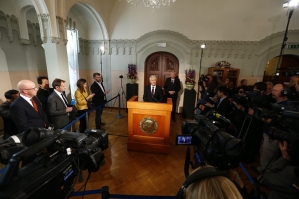
The 2013 Nobel Peace Prize is awarded Friday to the Organization for the Prohibition of Chemical Weapons (OPCW), the international watchdog helping to destroy Syria army's chemical weapons.
The Norwegian Nobel Committee in Oslo, Norway, selected OPCW as its recipient because of they have, through inspections, destruction and by other means, implemented the convention drawn in 1992-93 that bans the production and storage of chemical weapons.
Meanwhile, the OPCW inspectors have just begun working in the active war zone, and the prize committee said it hopes the award offers "strong support" to them as they face arduous and life-threatening tasks.
Committee chairman Thorbjorn Jagland said, "It is because of its long-standing efforts to eliminate chemical weapons and that we are now about to reach the goal and do away with a whole category of weapons of mass destruction. That would be a great event in history, if we can achieve that."
OPCW Director-General Ahmet Uzumcu told reporters Friday afternoon, according to CNN, "I truly hope that this award ... will help broader efforts to achieve peace in that country and (ease) the suffering of its people."
Acknowledging the award as a great honor, Uzumcu said that "events in Syria have been a tragic reminder that there remains much work yet to be done....The recognition that the peace prize brings will spur us to untiring effort, even stronger commitment and greater dedication," he said.
During World War One, chemical weapons were heavily used. Then, The Geneva Convention of 1925 were drafted to prohibited the use, but left some loopholes.
During World War Two, Hitler used poison gas in the mass exterminations during the Holocaust, when millions of people were killed. In 1997, the prohibition of production and storage of chemical weapons were also passed.
To date, over 189 states have acceded to the convention. Two states that still hasn't destroyed their chemical weapons stockpiles include the USA and Russia.
While global media have speculated that an individual would win, possibly Congolese physician Denis Mukwege, who treat victims of gang rape, or Malala Yousafzai, the teenage education activist from Pakistan whom a Taliban assassin shot for her work to promote education for girls.
CNN's Monita Rajpal asked the Peace Prize committee Chairman Thorbjorn Jagland why she did not win.
"Fortunately, we have many good candidates every year, actually this year, more than 250. And the woman you mentioned, Malala, is an outstanding woman, but we never comment on why she or others didn't get the prize," he said. "The right answer is that she didn't get the prize because OPCW got it. She and others will probably be candidates in the years to come."







